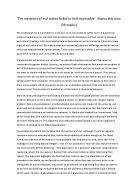HOW EFFECTIVE IS THE AUGUSTINIAN THEODICY IN EXPLAINING THE EXISTENCE OF EVIL & SUFFERING IN OUR WORLD?
Pamela Bolla 13SM
Philosophy Essay Task: ‘How effective is the Augustinian Theodicy in explaining the existence of evil & suffering in our world?’
Throughout history, the problems of evil and suffering have always been prevalent in the world. The problems can be split up into two types: moral evil and natural suffering. Moral evil is generally viewed as anything that is caused by humans and inflicts pain (physical or psychological) or death or obstructs life’s freedom and/or expression; for example, murder, war, crime. Natural suffering is generally viewed as events that occur because of the physical world or environment; for example, earthquakes, volcanoes, flooding. Evil and suffering therefore present believers in the ‘God of Classical Theism’ with a logical problem- one of them being the ‘Inconsistent Triad’. The ‘Inconsistent Triad’ consists of three premises: 1- God is omnipotent; 2- God is omnibenevolent; 3- there is evil in the world. All three premises cannot be true at the same time which means either God does not exist or there is no evil in the world.
St Augustine of Hippo, who lived from 354 to 430 AD in the Roman Province of Africa, was a Manichaean (Persian and Dualist religion) in his early until he later converted to Christianity. Augustine proposed a theodicy, which is an attempt to reconcile the existence of an omnibenevolent and omnipotent God with the undeniable fact of evil and suffering in the world; it is derived from the Greek words ‘theos’ or God and ‘dike’ or justice. Augustine’s theodicy explains that according to Genesis, God being perfect created a perfect world where because of ‘His’ goodness and perfection, God gave humans free will. Therefore, the possibility of evil is necessary as the world can never be as perfect as God. ‘The Fall’ is also central to his theodicy because when Adam and Eve disobeyed God, man’s original purity was lost and all their descendents inherited original sin and original guilt because they were ‘seminally present in the loins of Adam’. As a result, we all deserve the consequences which means moral evil is a misuse of our freedom and natural evil is punishment for all man’s sins.







